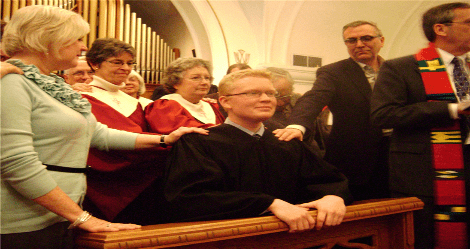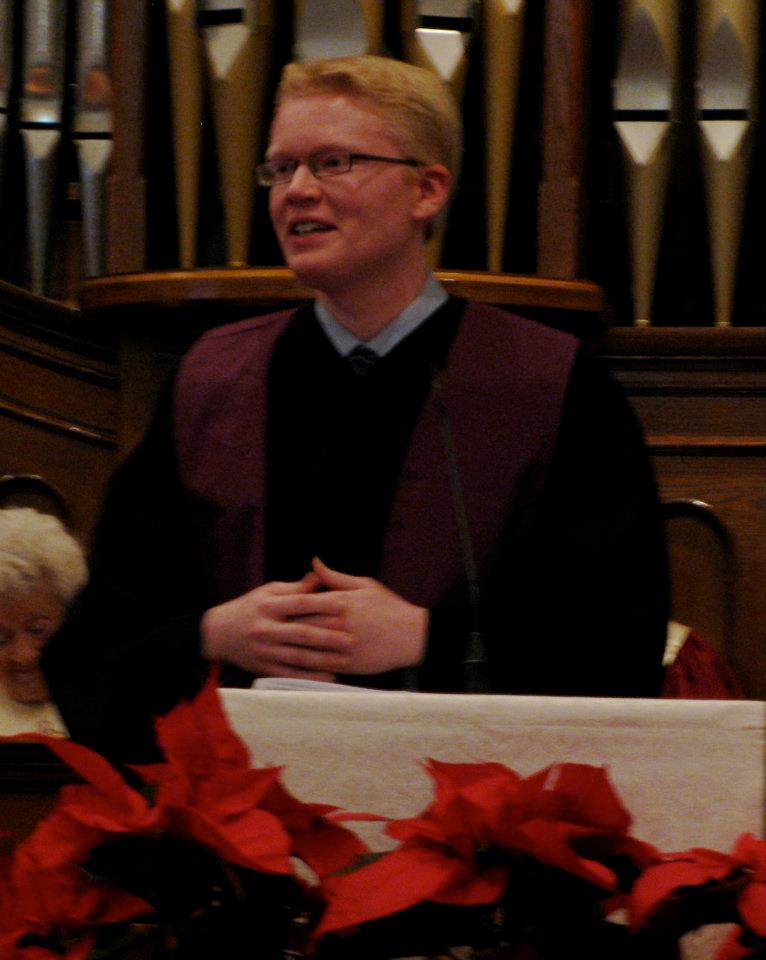Social Media as the New Agora
By Patrick David Heery, Unbound Managing Editor Patrick discusses the implications of a new e-ministry that has one leg online and the other on the ground (through churches and local organizers). He challenges Unbound and the church to think strategically about being both a citizen and a critic of the emerging e-world, which, along with social media, he likens to the Greek agora, the marketplace of debate visited by Paul in the Book of Acts (where he famously points to the altar dedicated “to a god unknown”)—the new public square. View and print as PDF
View and print as PDF
 Why Ordain a Web Editor?
Why Ordain a Web Editor?
I knew the question was bound to come up: “Why should the Presbyterian Church (U.S.A.) ordain you to be, of all things, an editor and web designer?” And sure enough, the question came. I was standing before a group of pastors and parishioners drawn from all across southeastern and mid Ohio. They were examining me for ordination. They asked me about my theology of baptism, my understanding of the relationship of Jesus and justice, what aspect in my confession of faith was the hardest to “confess,” and the like. Then, one gentleman raised his hand, received the microphone, and said something like, “We don’t usually ordain editors. Can you tell us how your position will be a ministry requiring and deserving of ordination?”
Fortunately, I had had a four-hour drive from Louisville, Kentucky, to come up with an answer to this anticipated question. In fact, I had had over four months, since the time when I was first offered the position as managing editor of what later was to be known as Unbound.
___________________________________________
When Paul entered Athens, he went to the agora, the political, intellectual, and economic center of the city—a Greek word for marketplace, much like the Latin “forum,” a thoroughly worldly site of commerce and debate. The church needs to recognize that the agora, the public square, of today’s world is not in D.C., London, or Beijing, but online. And it is a public square, we, like Paul, must enter.
___________________________________________
After all, my position is a non-traditional ministry. I spend much of my time in an office behind a computer, editing submissions, designing posts and images for the website, Facebooking, tweeting, emailing, and developing strategies for web communication. There aren’t too many babies popping in my office to be baptized. Though (warning: advertisement), babies are welcome to do so—with Session approval of course.
But non-traditional or not, it is a ministry. So, I said: I will preach the Word, but from a website. I will help create a community bound together by trust and relationship, sent into the world to speak and do the gospel, but… from a website. I will do mission, but my mission ground shall not be Tennessee or Indonesia; it will be online. I will witness—and enable others, through articles and resources, to witness—to the new reality of our Lord and Savior, Jesus Christ, and to the moral (read: justice) implications of that new reality.
My e-ministry would not take place in a vacuum. I would visit congregations, preach, lead worship, and preside over the Lord’s Supper. I would participate in conferences, network with organizations working locally, visit seminaries and college campuses, and build person-to-person relationships.
And I guess they found my argument convincing, because they ordained me. I hope, though, that their primary reason for endorsing my ordination was not because my position would include some components of traditional ministry. I hope it was because they too experienced God calling me (and the church) to a new form of ministry.
Paul in Athens: Re-Learning Mission
It is a new world out there. The church has to adapt.
Gospel-genuine mission takes its cue from the Book of Acts and Paul’s visit to Athens, Greece (Acts 17). As Luke portrays him, Paul quotes Greek poets, points to a stone altar dedicated to a god unknown, and says, I know that God and I would like to tell you about that God. We could perhaps dismiss Paul’s actions as the pragmatic appropriation of a culture in order to sweeten the cooptation. That is one reading.
But there is another reading: Paul (who, after all, was a Greek speaker and whose theology is influenced by Greek thought) had to respect and listen to the Greek culture, even learn from it, before seeking to share what he knew about God. That does not mean he agreed with every aspect of normative Greek culture. But it does mean that those doing mission must be prepared to learn as much about God as they are prepared to teach.
Neither Jesus nor Paul sacrifice their ethics and beliefs for some relativism or political correctness. They have their gospel theology and they stick by it. Jesus does not let the townspeople stone the woman just because that is what they think is right. But he also does not violently stop them. Instead, he inserts his body and his perspective into the action. He becomes an interlocutor. He engages.
And that is precisely what the church must do with this new world of social media, unfiltered e-news, interactivity, and multimedia.
The Church Still Has Much To Offer
The church need not abandon its principles and strengths. We need not turn Jesus over to some lowest denominator spirituality. Church is one of the few places where you can still find inter-generational communities. We practice tangible sacraments, offering liminal spaces where humanity and the divine connect. For over two thousand years, we have been a church for the poor and the oppressed, even when segments of the church have worshipped wealth and unequal power. We know the value of pastoral care, of sitting with the patient in the hospital, of listening to the incarcerated man or woman, of the person who just needs to hold onto you in hug for a little longer because without it, his or her knees would give out.
___________________________________________
The church needs to learn the poetry of this new world: its social and multi- media, its texting and tweeting. The church needs to watch events like what unfolded in Egypt and Tunisia where organizing on the ground (emphasizing the face to face relationality we hold so dear in the church) united with social media to create a revolution.
___________________________________________
Christianity offers a particular vision of God—a God who does the unthinkable and dies, so that we might live—a God who passionately loves—a God who walks among us in history, living with the poor and marginalized of the world—a God who has established a covenant relationship with humanity, requiring us to live holy, just, and compassionate lives—and yet a God who inexorably forgives us when we fail our end of the bargain. We do not have to give up that God. We should not give up that God.
That God certainly has not given up on us.
We should hold onto what makes us Christian, just as the unbound vocation incorporates traditional and essential modes of ministry (congregational worship, pastoral care…). But we cannot dig our feet into the mud of old media and refuse to budge before the emerging realities of this new world. If we do, we will get left behind, not only by the world, but by God.
 The New Agora
The New Agora
The church needs to listen to the new generations—young people that know all too well the historical and contemporary hypocrisies of the church—young people who crave connection, transformation, and spiritual vitality, not boring trite sermons or oppression-complicit institutions or church bickering or parents who use Sunday School as baby-sitting. The church needs to learn the poetry of this new world: its social and multi- media, its texting and tweeting. The church needs to watch events like what unfolded in Egypt and Tunisia where organizing on the ground (emphasizing the face to face relationality we hold so dear in the church) united with social media to create a revolution.
The church needs even to remember its own history and the transformations yielded by the then “new media” of the printing press and, in the 20th century, the blending of organized communities and a print newspaper through the Catholic Worker Movement (with Dorothy Day and others passing out the first issue in Union Square, New York City).
When Paul entered Athens, he went to the agora, the political, intellectual, and economic center of the city—a Greek word for marketplace, much like the Latin “forum,” a thoroughly worldly site of commerce and debate. The church needs to recognize that the agora, the public square, of today’s world is not in D.C., London, or Beijing—or Union Square—but online. And it is a public square, we, like Paul, must enter.
Designing an Interactive Journal of Christian Social Justice
When we began envisioning Unbound, we set out to make it a voice much like Paul’s in the agora. The Unbound we envisioned would use the language and techniques of the emerging agora of social media. It would listen intently to new generations of young people fed up with the church but who still believed in Jesus and justice.
It would be interactive, plugged into Facebook and Twitter, and saturated with multimedia: videos, music, art, poetry (we even talked about slam poetry!), and podcasts. It would enable users to create profiles, specify interests and identities, and engage other users in real-time conversations. It would empower collective input: users could help determine the themes of upcoming issues, submit their own articles and artistic expression, and drive the creative direction of the journal and site.
Fitting to the interests of the agora, the marketplace, we planned to launch with an issue on economics.
___________________________________________
Perhaps all of social media is just one big altar made out to a god unknown.
___________________________________________
But this new e-journal would not simply conform to the patterns and practices of electronic media. Recognizing the challenges of online discussion, so often derailed by abusive language and anonymity, we decided to require the creation of a registered, free account before users could make comments and join conversations. We also set out to assemble a collection of user-moderators who would help discussions remain productive and respectful. If done right, online conversation would then offer a reflection of real-life conversation, which is messy, complex, and emotionally charged, but when, in the context of community, can be accountable to ethical standards.
Recognizing, furthermore, the superficiality of much online content, we determined to make Unbound accessible but substantive—a collection of creative, thoughtful content through which readers could grow (intellectually, spiritually, personally) and be inspired to take action.
Recognizing how self-contained the Internet can be, how Facebook friends can substitute for real friends, how people can pontificate online on matters of justice without making a single change in their own lives, we wanted Unbound to have one leg online and another on the ground. Users could visit the site, talk with other users, read articles, post videos, network, but then find a local action (or worship service or organization) posted on the site and go, participate, connect. Unbound itself could host a network of local organizers bringing together communities, empowered to act on the site’s articles and resources, while in turn driving the themes of the journal by reporting “from the front.”
We, therefore, meant Unbound, from the beginning, to be both a citizen and a critic of the emerging agora. We are a journal in-process. Our assembly of moderators and local organizers remains in the planning stage. Interactivity is still limited. But since launching in October, we have published three issues and posted many blog articles, action alerts, events, worship and action resources, and multimedia. Several thousand people have visited the site; many hundreds have registered. Daily, Unbound is on Facebook and Twitter. In January 2012, we participated in an emerging medium called the “twinterview” in which a moderator and other Twitter accounts pose questions and the interviewee (in this case, Unbound) responds, all real-time, all in 140 or fewer characters.
Like Paul in the agora, like Jesus with the woman being stoned, Unbound is working to insert itself into the action of a world increasingly—for better or worse—online.
For, perhaps, all social media is just an unnamed urge for an unnamed God, a plea for connection and purpose, a set of people determined to be part of something, anything, a need for an identity better than the one lived out among “real” people. Perhaps all of social media is just one big altar made out to a god unknown.
And perhaps, Jesus, the Emmanuel—“God among us”—is the god they seek.
_________________________________________________________________________
Patrick David Heery, Rev., is the Managing Editor of Unbound. He staffs the Advisory Committee on Social Witness Policy as the Associate for Social Media and Social Witness. He was recently ordained as a Teaching Elder in the Presbyterian Church (U.S.A.) and is a graduate of Princeton Theological Seminary with a Master of Divinity. He has a Bachelor of Arts in English, and another in Classics, from Ohio University.
Banner photo by Armin Hanisch.











Pingback: To a God Unknown: Social Media as the New Agora | Unbound | churchtechfeeds.com